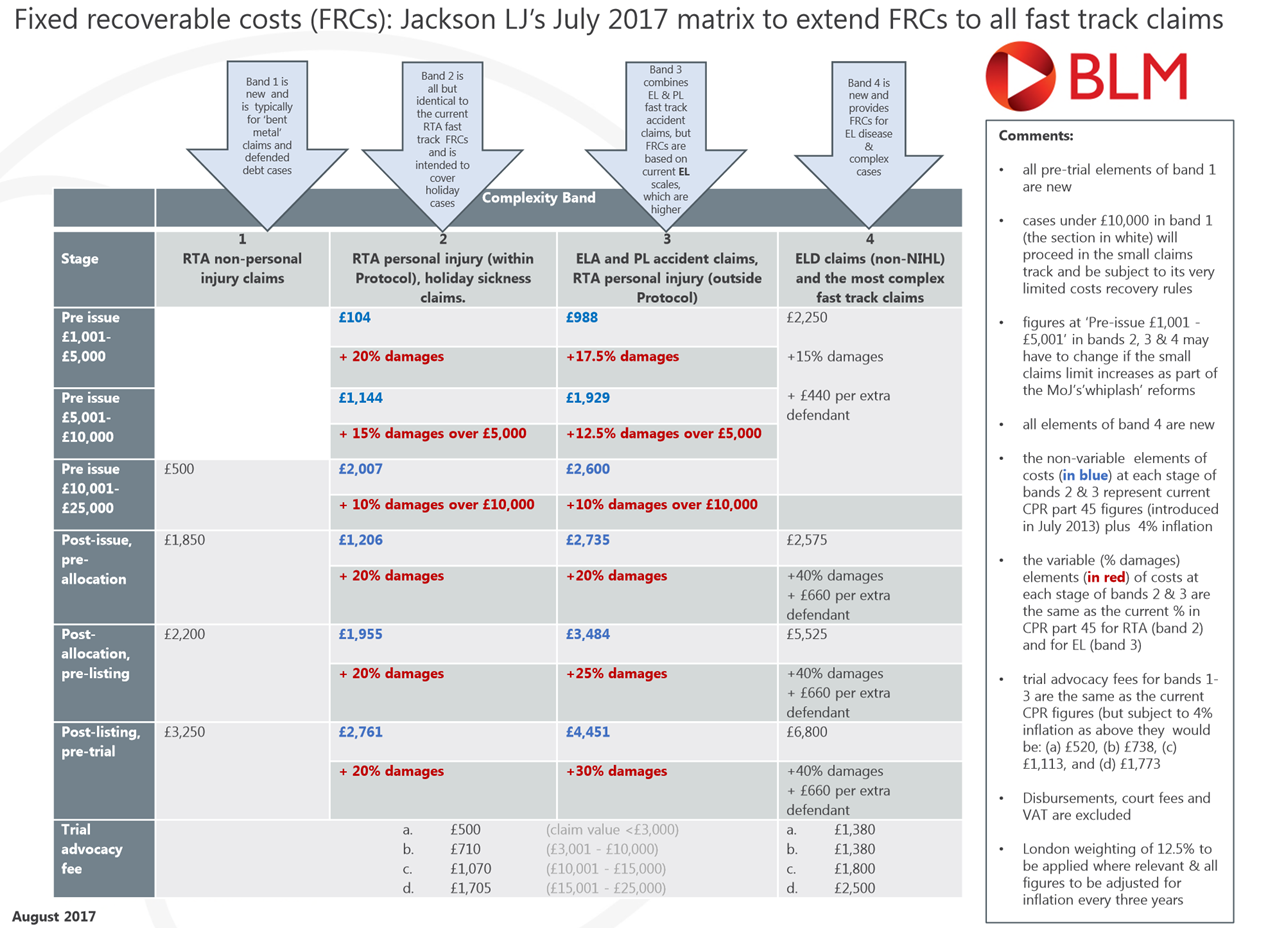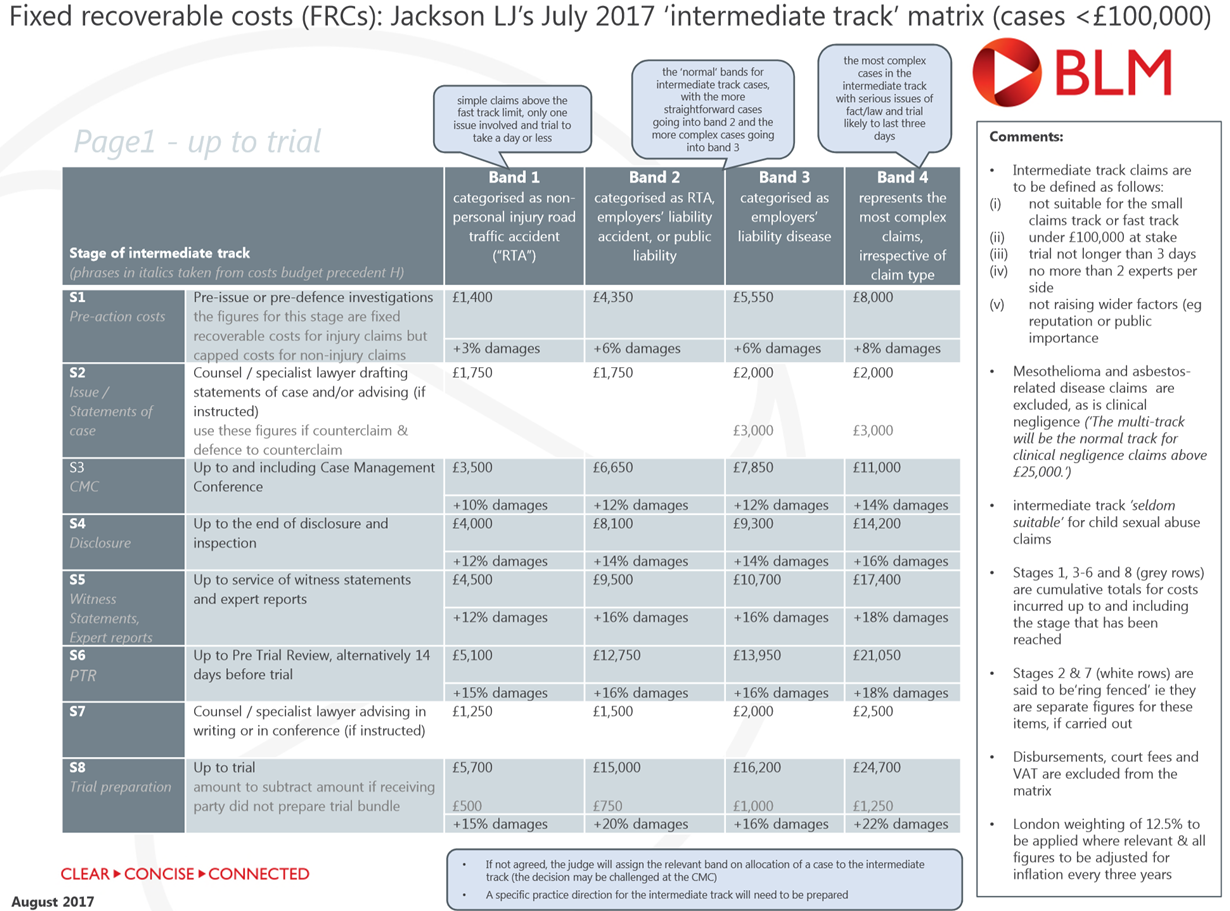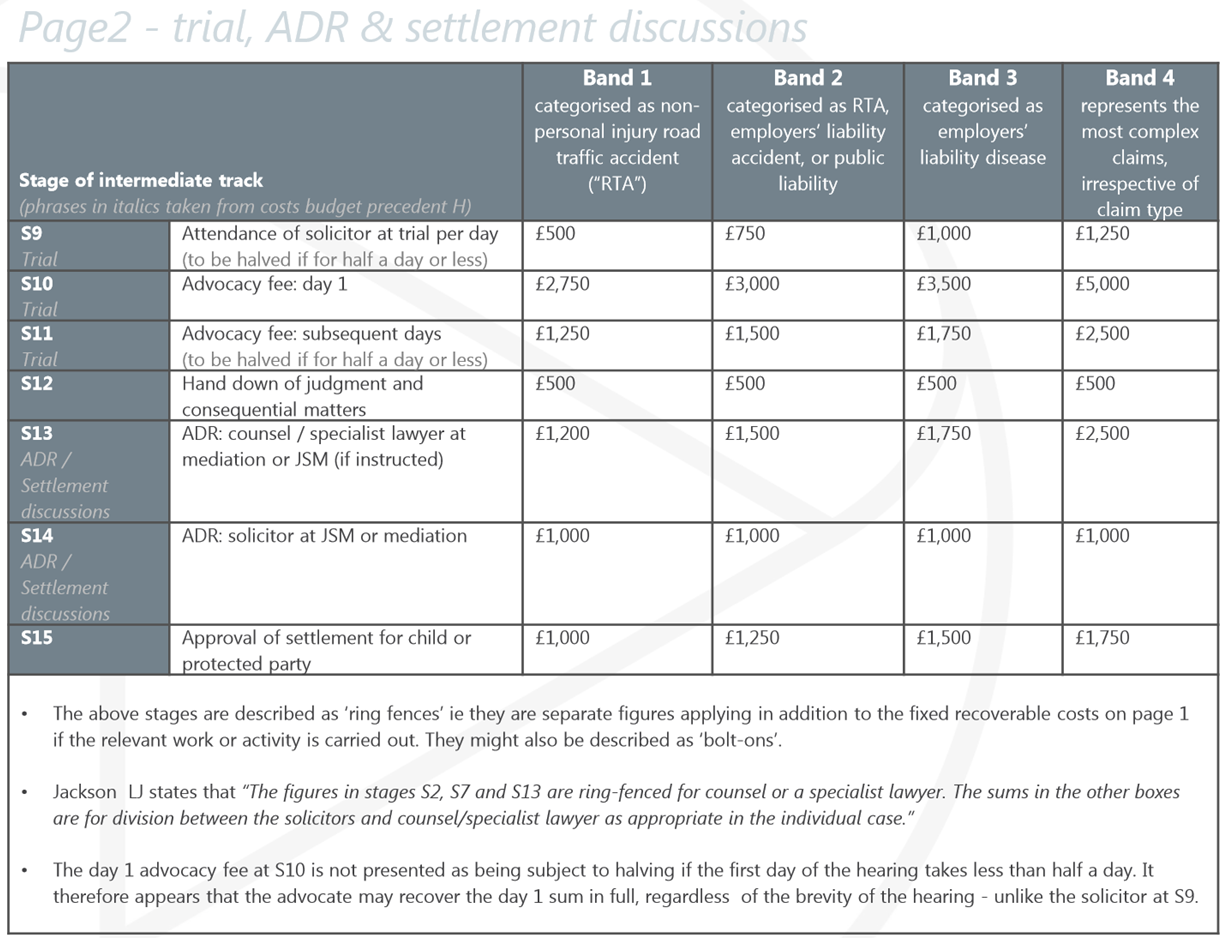Extending the scope of fixed recoverable costs: government consults on ‘Jackson 2’
- Details
 Adam Burrell and Alistair Kinley consider the key elements in the Government's consultation on extending fixed recoverable costs in civil claims.
Adam Burrell and Alistair Kinley consider the key elements in the Government's consultation on extending fixed recoverable costs in civil claims.
On 28 March 2019 – in the heat of Brexit uncertainty – the Ministry of Justice launched a short consultation aimed at extending fixed recoverable costs (FRC) in civil claims. The thrust of the consultation, which runs to 6 June 2019, is that the Government very much intends to take forward Sir Rupert Jackson’s 2017 recommendations largely unamended (although there will be carve outs, i.e. specific regimes, for lower value clinical negligence cases and for noise-induced hearing loss claims).
Our view is that these reforms could be implemented entirely by secondary legislation and perhaps as early as April 2020, in which case their introduction would coincide with the preferred implementation date for the whiplash reforms and small claims increases which are already very much in the MoJ’s delivery pipeline.
The content of the current consultation is set out below, which includes tables showing the extended FRC schemes that we prepared when ‘Jackson 2’ was first published in 2017 (the tables are still valid since the MoJ has used the same figures throughout).
BLM will submit a positive response to this current consultation, as it did in the run up to the 2017 recommendations. There will also be events and briefings to discuss the contents and assist clients with their own responses. Further updates and commentary will be provided as matters develop, but please get in touch with us if you would like any further information on this activity.
A new consultation before implementing the further changes
Sir Rupert Jackson published his report on extending fixed recoverable costs (‘FRC’) in July 2017. The focus of his proposals was the largely unfinished business of costs reform following his ground-breaking 2010 report, which was implemented in 2013 via part 2 of the Legal Aid Sentencing & Punishment of Offenders Act 2012, by secondary legislation and by changes to the CPR.
It has widely been anticipated that his 2017 recommendations to extend the scope of fixed recoverable costs - horizontally across the entire fast track and vertically to claims valued up to £100,000 - would be implemented by the Government [for example, in this blog from last July and the header of this recent costs newsflash]. Finally, the Ministry of Justice has opened a formal consultation about implementation, with responses accepted until 6 June 2019.
Scope of the consultation
The government is seeking views on three specific areas:
- extension of FRC for all cases in the Fast-track;
- extension of FRC for certain types of ‘intermediate’ cases; and
- the introduction of costs budgeting in ‘heavy’ judicial review cases.
Clinical negligence cases and Business and Property Court cases are not covered by the consultation, as the former are subject to a Civil Justice Council working party and the latter, a pilot that runs until January 2021.
A new intermediate track
One of the central recommendations in the 2017 report was the creation of a new track that would sit between the fast track and the multi-track called the 'intermediate track'. This new track would deal with claims between £25,000 and £100,000 in value with certain limits on features such as number of experts and length of trial. The government has rejected the creation of a new track and instead intend to expand the fast track to include ‘intermediate cases’.
Complexity bands
A key feature of the proposed FRC, for both current scope fast track cases and the intermediate cases that it is proposed will be brought into scope of the fast track, is the introduction of complexity banding. A case that is placed higher along the scale of the four proposed bands provides for increased amounts. There is clear scope for disputes over the appropriate banding and such disputes will be dealt with at the first Case Management Conference. If the only issue is the complexity banding, the successful party will incur a costs liability to the successful party of £300 for intermediate cases and £150 for other fast track cases.
The figures (click on image to enlarge)
The complexity bandings for cases currently in the scope of the fast-track would depend on case type as follows:
- Band 1 would be the simplest cases RTA non-PI claims such as ‘bent-metal’ vehicle damage and defended debt claims;
- Band 2 would be for RTA PI claims within the portal;
- Band 3 would be RTA PI claims outside the portal, EL accident, PL, tracked possession, housing disrepair and other money claims;
- Band 4 would be for EL disease excluding NIHL, complex possession and housing disrepair, property and professional negligence.
Views required on current scope fast track complexity bands
The allocation of cases to bands is a specific topic that the government is seeking views on, both generally and specifically it is queried what band (2 or 3) that package holiday sickness claims should be. The proposal is to deal with multiple claims arising from the same facts by allowing 10% of the FRC amount for each additional claimant. It’s clear that the intention is to discourage escape from the regime and whilst a theoretical discretion to allow ‘exceptional circumstances’ is maintained as exists in current FRC, views on how the rules can be ‘fortified’ to keep cases within scope are requested.
Noise induced hearing loss (NIHL)
NIHL claims are not included in the complexity banding as the consultation confirms the government’s intention to implement the recommendations contained in the Civil Justice Council’s final report on NIHL from September 2017.
The report was a collaboration between claimant solicitors and defendant insurers and their advisors, aimed at setting out the terms on which parties would engage in NIHL claims, along with a matrix of costs to enable efficient and proportionate running of claims. BLM’s Paul Wainwright represented the defendant group and a summary is provided here.
The proposed cost matrix is for ‘straight-forward’ NIHL claims involving ‘up to three’ defendants. The table of costs is for claims under £25,000 and is split into pre-litigation costs and post litigation costs with admissions. The aim of this regime is for the parties to effectively run NIHL claims, where defendants will control the flow of the litigation but if either party wishes to drop out they need only instruct their own medical expert to fall outside of the regime.
The consultation seeks parties views generally on the stated intention to implement the extension of FRC to NIHL claims and in particular the proposed new pre-litigation process, proposed standard directions and separate preliminary trials.
Intermediate cases
The figures (click on image to enlarge)
Complexity bands for intermediate cases
- Band 1 consists of the simplest cases, with just one contested issue and the trial will not last longer than one day.
- Bands 2 and 3 will form the usual intermediate banding with the more complex cases in 3 and less so in 2.
- Band 4 will be reserved for the most complex such as business cases and EL disease claims where the trial will last three days and there are ‘serious’ issues of fact and law.
Unlike the banding for the current fast track scope cases, banding for the intermediate cases will not be made with reference to the claim type but to the features of the case.
Key issues arising from implementation of an extension to FRC
- It’s clear that a key dispute will be around the appropriate complexity banding and for intermediate cases whether it falls within scope of being classed as intermediate. There will be a clear incentive to increase the value of the claim if this increases the costs amount.
- Modelling the impact of the proposed figures and comparing them with current spend on similar cases requires accurate data. There is also the difficulty of trying to factor in the impact of implementation. For example, commercially there has not been any incentive to establish a claim’s potential value at say £125,000 rather than £90,000 until now.
- There are constantly attempts to circumvent the current FRC. One issue that has arisen is the impact of being awarded indemnity costs and whether that entitles a party to avoid FRC. The law is currently that an award of indemnity costs arising from a part 36 offer entitles a party to a detailed assessment of those costs. However, the intention is to award a penalty of 35% and avoid a scrutiny of the work actually undertaken. Views are invited on whether the suggested percentage is an appropriate amount (not on whether it’s appropriate at all) and also on whether there should be something else for unreasonable conduct indemnity costs.
Impact on the consumer
The consultation questions “whether it is practical or reasonable to require detailed records of costs incurred for every FRC case” and points out that the requirement to keep records is only necessary if an assessment of costs is likely.
The important balance to be struck here is between the emphasis placed on the obvious commercial attractiveness of creating a system that does away with the need for record keeping by lawyers and the need to maintain professional levels of service appropriate to each client’s needs. At a principled level, a properly-designed and implemented system of fixed recoverable costs should contribute to the efficient processing of large numbers of reasonably similar claims, on something of a ‘swings and roundabouts’ basis. This inherent feature of the system probably tends to reinforce the evolution towards ever-larger specialist firms in the PI practitioner market.
The drive for business efficiency should not, however, tip over into corner-cutting and lowering of standards. There is no doubt that paying parties may face increased handling difficulties and expense if standards drop, as seems to be recognised in the MoJ’s impact assessment:
“There is a potential risk that claimant settlements might be lower in future. This risk might materialise if claimant lawyers reduce the time and resource they spend on cases in response to FRC, and if as a result, settlement negotiations lead to worse outcomes for claimants. Whether this risk materialises would depend upon the behaviour of defendants in such settlement negotiations.”
Judicial Review
The government intends to introduce costs budgeting for Judicial Review (‘JR’) cases where it is anticipated that costs will exceed £100,000. They do not however agree with the recommendation to introduce the means tested fixed costs that apply in some environmental JR cases. Views are requested on whether this is an appropriate criterion or whether an alternative should be used.
Next steps
The consultation is open for responses until 6 June 2019. It is estimated that the earliest likely implementation would be April 2020 which is when it is anticipated that the small claims limit might well be increased to coincide with the Civil Liability Act coming into force.
There is a possibility that April 2020 might be a ‘big bang’ of civil costs reform. Whether or not the clear and robust intention of extending the scope of FRC, which is the subject of this consultation, will survive any potential change of government, or lead Ministers that might occur as the UK’s political arrangements with Europe develop remains to be seen.
That said, implementation of these reforms does not require any new primary legislation being passed by parliament and on that basis, it may be prudent to prepare for it coming into force in perhaps arounds a year’s time.
Adam Burrell is partner and head of costs and Alistair Kinley is Director of Policy & Government Affairs at BLM. Adam can be reached on 0121 634 6444 or
18-03-2026 1:00 pm
22-04-2026 11:00 am
01-07-2026 11:00 am




























